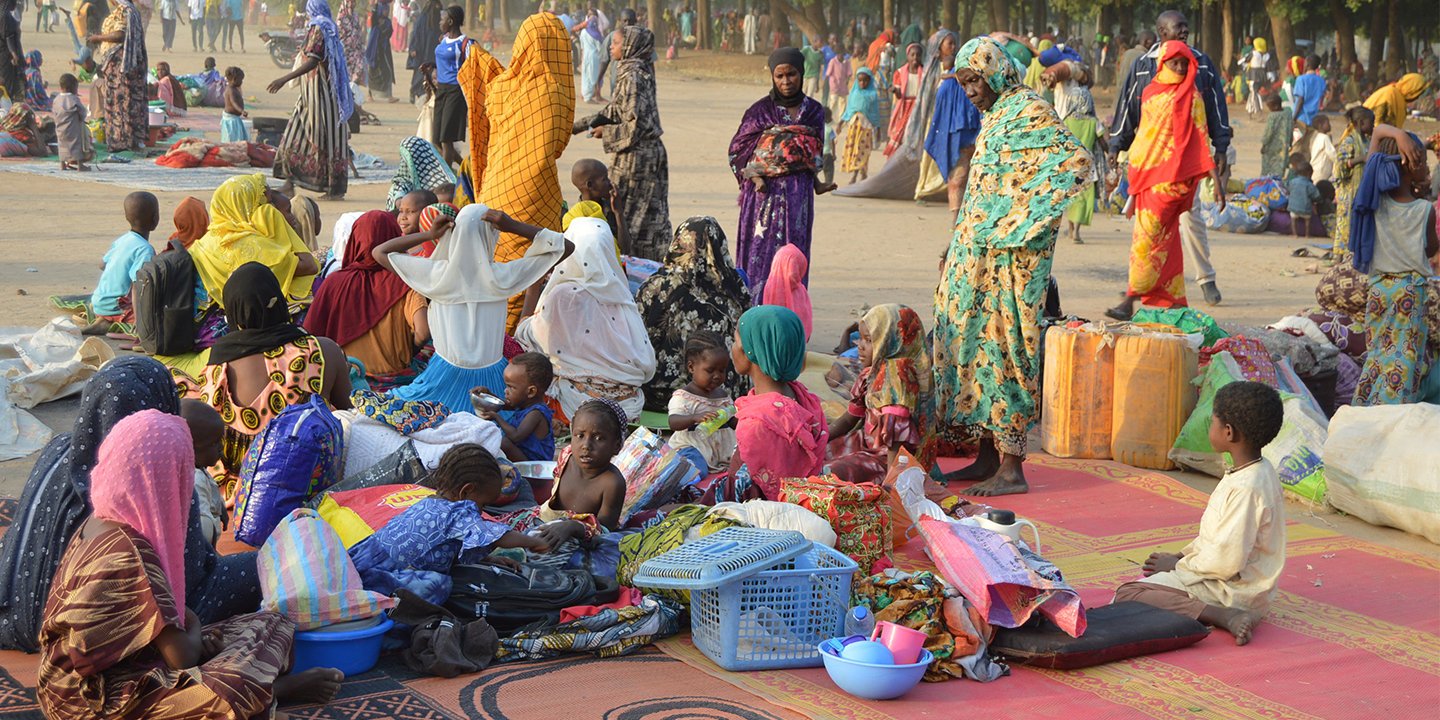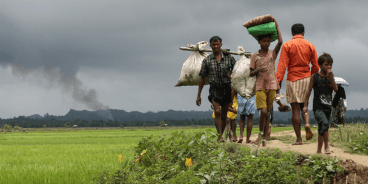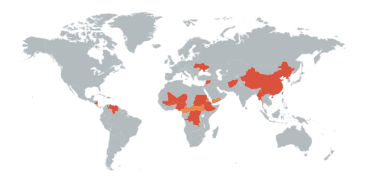

Atrocity Alert No. 282: Cameroon, China and Bosnia and Herzegovina
Atrocity Alert is a weekly publication by the Global Centre for the Responsibility to Protect highlighting situations where populations are at risk of, or are enduring, mass atrocity crimes.
INTER-COMMUNAL VIOLENCE DISPLACES THOUSANDS IN CAMEROON
Since 5 December at least 22 people have been killed and 30 seriously injured during several days of renewed inter-communal violence in the Far North region of Cameroon. The clashes erupted following a dispute over access to dwindling land and water resources between the Shoa Arab herder community and the Massa farmer and Mousgoum fishermen communities in Kousseri, Logone and Chari. According to the UN Refugee Agency, thousands of people have been internally displaced while more than 30,000 have fled to neighboring Chad. Eighty percent of those newly arrived in Chad are women and children.
The recent spate of violence is the latest flare-up of inter-communal fighting in northern Cameroon, which has escalated in recent years. During August similar clashes erupted in Kousseri leaving 45 people dead and more than 23,000 forcibly displaced. Tensions in the Far North region have been exacerbated by the climate crisis. In the last few decades, growing desertification has led to water scarcity and limited access to grazing land. As a result, Massa farmers and Mousgoum fishermen dig large trenches to conserve water in order to fish and cultivate crops. These muddy trenches have trapped and at times killed cattle belonging to Arab Shoa cattle herders, fueling tensions and fighting. In turn, Massa farmers and Mousgoum fishermen have accused Arab Shoa herders of allowing their cattle to destroy plantations and areas reserved only for fishing.
Climate change has been recognized as a “threat multiplier” for conflict and atrocities because of its potential to exacerbate existing threats. Juliette Paauwe, Senior Research Analyst at the Global Centre for the Responsibility to Protect, emphasized that, “meaningful programs that tackle poverty, radicalization, corruption and environmental degradation are urgently needed if the government of Cameroon wants to address the root causes of inter-communal violence and prevent further escalation.”
Populations are also facing security threats due to the armed conflict between government forces and armed separatist groups in the Anglophone regions of Cameroon, which has dangerously escalated since the beginning of this year. Armed separatists are increasingly using heavy weaponry, including improvised explosive devices (IEDs) and anti-tank rocket launchers. Consequently, government forces have intensified their operations against separatist strongholds. Throughout the conflict, government forces have been widely accused of extrajudicial killings of civilians suspected of collaborating with separatists and the burning of entire Anglophone villages. The military allegedly launched retaliatory attacks against the north-west towns of Mbengwi and Bamenda on 8 December after a reconnaissance mission was hit by an IED. Troops allegedly searched for armed separatists, killing at least 13 people, arresting several youths, and torching an estimated 20 houses.
Despite the deteriorating security situation, the African Union and UN Security Council have failed to effectively respond to the risk of atrocities in Cameroon. The international community must urgently engage with President Paul Biya and ensure the government upholds its responsibility to protect all populations in Cameroon, regardless of language, cultural identity or political affiliation.
INDEPENDENT TRIBUNAL CONCLUDES CHINA IS COMMITTING GENOCIDE AGAINST UYGHURS
An independent tribunal ruled on 9 December that the Chinese government is perpetrating genocide and crimes against humanity against Uyghurs (or Uighurs) and other majority-Muslim ethnic groups in the Xinjiang Uyghur Autonomous Region (XUAR). In the absence of formal legal measures at international courts, the London-based Uyghur Tribunal – composed of a panel of lawyers, academics, and others – had been investigating allegations of mass atrocities in the region since 2020. During the tribunal, Uyghurs and members of other majority-Muslim ethnic groups from China told their personal stories of surviving mass atrocities perpetrated by Chinese authorities.
The tribunal determined that President Xi Jinping, XUAR Party Secretary Chen Quanguo and other top officials bear primary responsibility for crimes against humanity and genocide. The crimes against humanity include torture, forcible transfers, imprisonment, enforced disappearances, and rape and other forms of sexual violence.
The judgement stated that, “the Tribunal is satisfied beyond reasonable doubt that the PRC [People’s Republic of China], by the imposition of measures to prevent births intended to destroy a significant part of the Uyghurs in Xinjiang as such, has committed genocide.” For years China has imposed coercive population control polices, including forced sterilization and abortion, against Uyghurs and other majority-Muslim ethnic groups. According to Chinese government data, the 2020 birth rate in XUAR was only 8.14 per 1,000 people, nearly half the 2017 figure. These coercive population control policies were the main reason behind the tribunal’s genocide determination. Under Article II of the Genocide Convention, imposing measures intended to prevent births within a particular group can constitute genocide.
Spokesperson for the UN High Commissioner for Human Rights, Rupert Colville, said that, “the Uyghur Tribunal has brought to light more information that is deeply disturbing in relation to the treatment of Uyghurs and other Muslim ethnic minorities in Xinjiang.” He added that the Office of the UN High Commissioner for Human Rights is finalizing its long-awaited report on human rights abuses in XUAR, which will likely be made public in a few weeks after the report is shared with the Chinese government.
The release of the tribunal’s judgement occurred amidst a slate of governments announcing diplomatic boycotts of the upcoming 2022 Beijing Olympics due to the atrocities in XUAR, including Australia, Belgium, Canada, Kosovo, the United Kingdom and the United States. Furthermore, on 14 December the Uyghur Human Rights Project and the World Uyghur Congress announced they will submit a criminal complaint under the principle of universal jurisdiction to a court in Argentina for atrocities against the Uyghurs.
Liam Scott, Research Associate at the Global Centre for the Responsibility to Protect, said that, “the Uyghur Tribunal’s ruling is groundbreaking. Although it lacks official legal authority, the tribunal has operated under the highest of legal standards, and its moral and intellectual weight is immense. UN member states must take more substantial action in combatting these atrocities, and the tribunal’s ruling should inform that process.”
SECESSIONIST MOVES INCREASE RISK OF ETHNIC VIOLENCE IN BOSNIA AND HERZEGOVINA
On Friday, 10 December, Serb lawmakers of the lower house of parliament of the Republika Srpska in Bosnia and Herzegovina voted to begin the Republika’s exit from key institutions within the country, raising concerns of heightened ethnic tensions and sparking warnings from the international community about a possible new conflict. The non-binding motion intends to detach the armed forces, judiciary and tax system from Bosnia, paving the way for secession. The proposal won a clear majority with 49 votes in favor in the 83-seat chamber.
The Republika’s president, Milorad Dodik, who is behind the move for secession, called Friday’s vote “the moment of conquering the freedom for Republika Srpska.” While the vote is only advisory – and unlikely to make it past the region’s upper house – it represents a dangerous escalation of separatist sentiment that could increase the risk of ethnic violence if not adequately addressed and combatted.
Prior to the vote, Christian Schmidt, the UN High Representative for Bosnia and Herzegovina, warned the UN Security Council during November that the country was facing “the greatest existential threat of the postwar period,” and that there is a “very real” prospect of renewed conflict. In his report delivered to the UN Secretary-General, Schmidt stressed that Dodik’s actions “endanger not only the peace and stability of the country and the region, but – if unanswered by the international community – could lead to the undoing of the [Dayton peace] agreement itself.” The Dayton Peace Agreement ended the 1992-1995 war in Bosnia, which resulted in approximately 100,000 people killed and 2 million displaced.
High Representative Schmidt also raised alarm that should the armed forces of Bosnia and Herzegovina splinter into two or more armies, international peacekeepers would need to be deployed to prevent the slide towards a new war. He also claimed there is a risk of clashes between Bosnian national law enforcement agencies and Bosnian Serb police. During October Bosnian Serb police held an “anti-terrorist” drill outside the capital of Sarajevo, in a move perceived by many as a provocation by the Serb separatist leadership. The exercises were held in Mount Jahorina, from where Serb forces shelled populations in Sarajevo during the war.
While several states, including France, Germany, Italy, the United Kingdom and the United States, have condemned the vote, further preventive action is urgently needed. The international community must heed the warnings of High Representative Schmidt and support reconciliation practices as well as condemn any inflammatory rhetoric, hate speech and separatist sentiments.
Related Content


Atrocity Alert No. 420: Myanmar (Burma), Syria and Forced Labor
